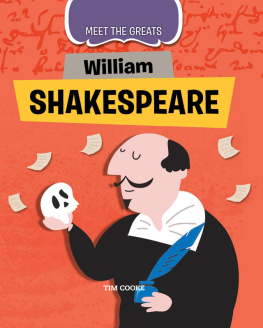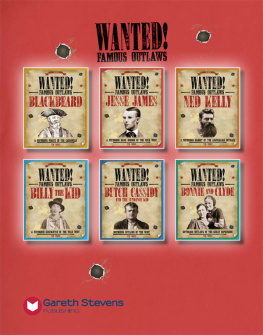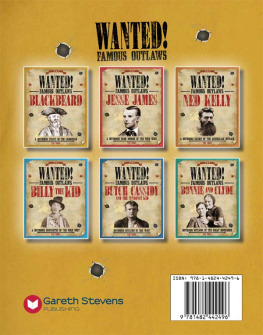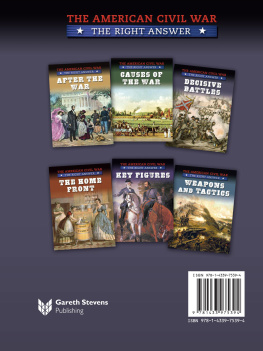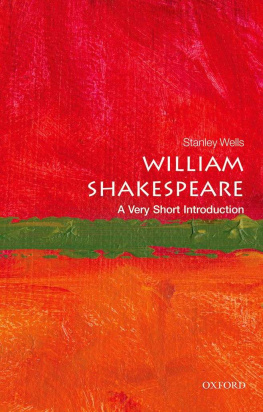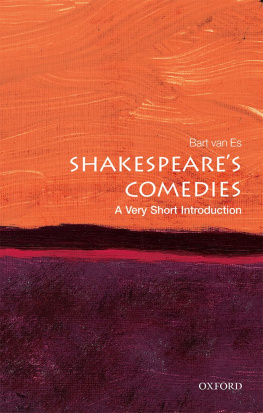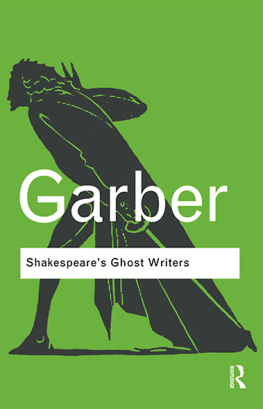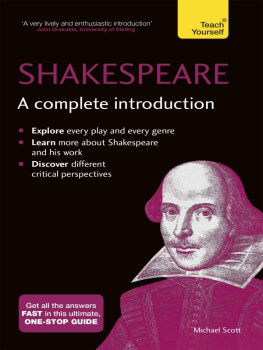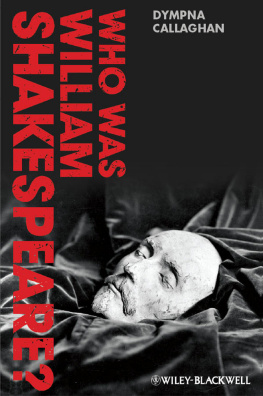
Please visit our website, www.garethstevens.com.
For a free color catalog of all our high-quality books, call toll free 1-800-542-2595 or fax 1-877-542-2596.
CATALOGING-IN-PUBLICATION DATA
Names: Cooke, Tim.
Title: William Shakespeare / Tim Cooke.
Description: New York : Gareth Stevens, 2017. | Series: Meet the greats | Includes index.
Identifiers: ISBN 9781482459647 (pbk.) | ISBN 9781482459661 (library bound) | ISBN 9781482459654 (6 pack) Subjects: LCSH: Shakespeare, William, 1564-1616--Juvenile literature. | Dramatists, English--Early modern, 1500-1700--Biography--Juvenile literature.
Classification: LCC PR2895.C66 2017 | DDC 822.33--dc23
Published in 2017 by
Gareth Stevens Publishing
111 East 14th Street, Suite 349
New York, NY 10003
Copyright 2017 Brown Bear Books Ltd
For Brown Bear Books Ltd:
Editorial Director: Lindsey Lowe
Managing Editor: Tim Cooke
Childrens Publisher: Anne ODaly
Design Manager: Keith Davis
Designer and illustrator: Supriya Sahai
Picture Manager: Sophie Mortimer
Concept development: Square and Circus / Brown Bear Books Ltd
Picture Credits: Front Cover: Character artwork, Supriya Sahai. Interior: KB National Library of the Netherlands: 10b; e venise: 36; Metropolitan Museum of Art: 9; Public Domain: thinlink/engelshitoria/duna/RHL 13; Shutterstock: AnersPhoto 42b, Arena Photo UK 43, George Kollidas 21, Peter Turner Photography 8t; Thinkstock: Bycostello Photography 30, Dorling Kindersley 15, istockphoto 34, 38t, 40, George Kollidas 38b, Photos.com 19, 23, 28, 29, 31; Wellcome Images: 22t; Westminster Abbey: 39; Wikipedia: Elliot Brown 10, Corpus Christi College, Cambridge 20, Dulwich Picture Gallery 24, Folger Education 14, 22b, Folger Shakespeare Library 35t, Topham Forrest 32, Tony Hisgett 33, Illustrated London News 25t, PD/RHL 25b, J. Schneider 12, Sotherbys New York 41, Tulane Public Relations 11, Johannes de Witt 18, Yale University: Beinecke Rare Book & Manuscript Library 42t, Searching for Shakespeare/Tanya Cooper/YUP 25br.
Character artwork Supriya Sahai
All other artworks Brown Bear Books Ltd
All rights reserved. No part of this book may be reproduced in any form without permission from the publisher, except by a reviewer.
Printed in the United States of America
CPSIA compliance information: Batch CW17GS : For further information contact Gareth Stevens, New York, New York at 1-800-542-2595.
Contents
William Shakespeare wrote some of the most famous plays ever written. They are still popular today.
W illiam Shakespeare (15641616) is the most famous playwright in the world.
Even though it is 400 years since Shakespeare died, at least one of his plays is being performed every day somewhere in the world. The plays have been translated from English into more than 75 languages. They have been turned into comic books, movies, musicals, ballets, and puppet shows. There are Shakespeare theater companies and Shakespeare festivals all around the world.
Shakespeare wrote 37 plays and 154 poems known as sonnets, but we know very little about him as a man. There are no records about much of his life. Some people believe that Shakespeare did not even write the plays for which he is famous. But for most people, Shakespeare expressed ideas about how people behave toward each other that are as true today as they were 400 years ago.
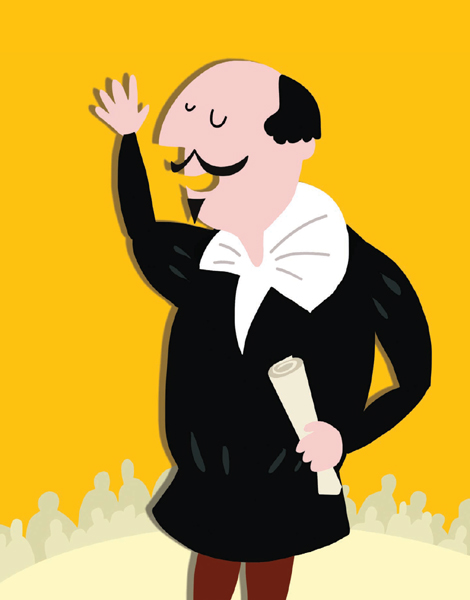
Obscure
BEGINNINGS
There were no signs in Williams early life that he would grow up to be one of the greatest of all writers.
W e know very little about Shakespeares early life. For example, no one knows his exact birthdate in 1564. It is usually said to be April 23, which is St. Georges Day. St. George is the patron saint of England. Church records note that Shakespeare was baptized on April 26, 1564. Babies in Elizabethan England were usually baptized three days after their birth. We do know for sure that William was born in Stratford-upon-Avon, which is a small town in Warwickshire in central England. Stratford was a quiet, rural place where many people were farmers.
MEET THE GREATS: WILLIAM SHAKESPEARE
QUICK FACTS
* No one knows Williams real birthday.
* After leaving school, at age 14, most boys like William went to university. William did not!
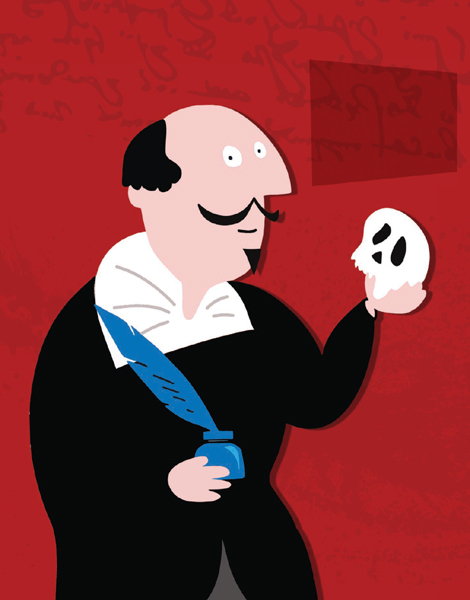
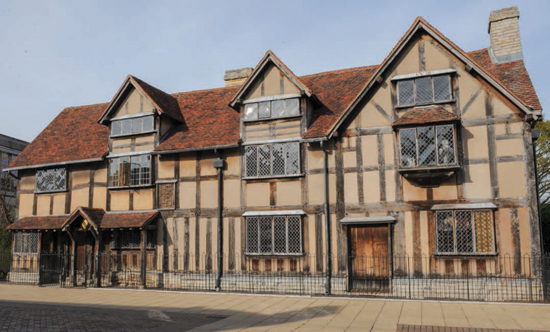
William was born in the house on the left of this photograph.
SHAKESPEARES FAMILY
William was the third of eight children born to Mary and John Shakespeare. His mother, Mary Arden, was the daughter of a wealthy landowner. William had two older sisters, but they died when they were still babies. Soon after Williams birth, plague reached Stratford. The disease killed 200 people in the town, but William survived. Mary and John Shakespeare had another five children after William. The youngest, Edmund, was born in 1580. By that time, William was 16 years old.
As the oldest child, William would have been expected to help with his brothers and sisters at home and to set a good example for them.
AN IMPORTANT FAMILY
John Shakespeare was a glove maker. That was an important job in Elizabethan England. John was successful and bought property and houses in Stratford. In 1568, when William was four years old, John was elected as mayor of Stratford for a year. He held other positions in the town government over the next 20 years. Around the start of 1577, however, Johns business began to decline and by the 1580s he was in debt. He had to use all his wifes money, and he eventually lost his positions in Stratfords government.
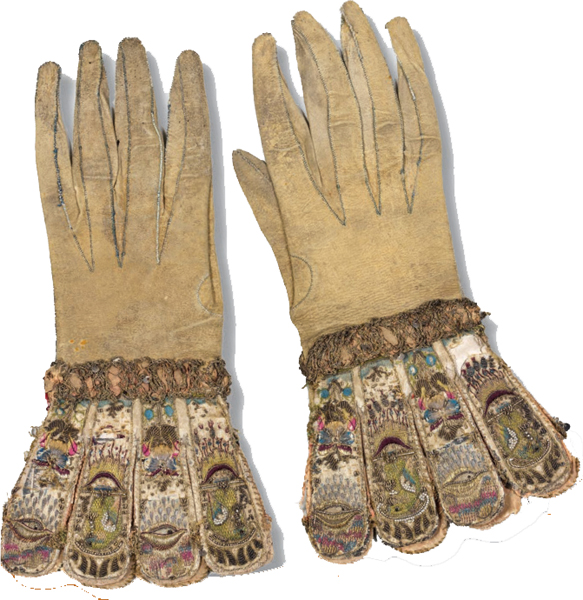
In Elizabethan times, everyone wore gloveseven indoors!
OFF TO SCHOOL
At about five years old, William went to his first school. At the time, only boys went to school. Girls were taught at home and learned how to sew and cook and keep house.
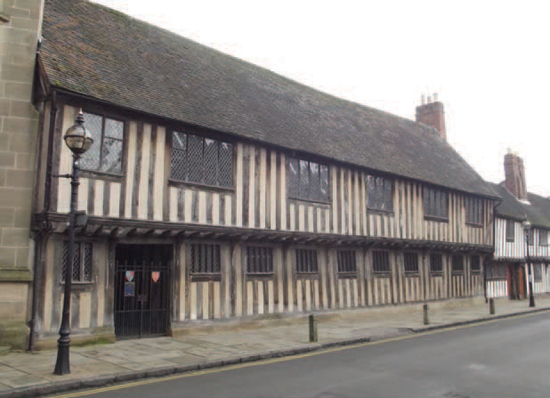
Kings New School, Stratford.
At age seven, William went to Kings New School in Stratford. He went to school six days a week.
All lessons were taught in Latin, which was common in the 1500s. All the important jobs of the daymedicine, the Church, teaching, law, and politicsused Latin. The boys learned to read and write Latin using a hornbook. They also learned Greek, ancient history, and rhetoric, which was the art of making speeches. Every boy made his own quill pen by cutting the end off a goose feather.
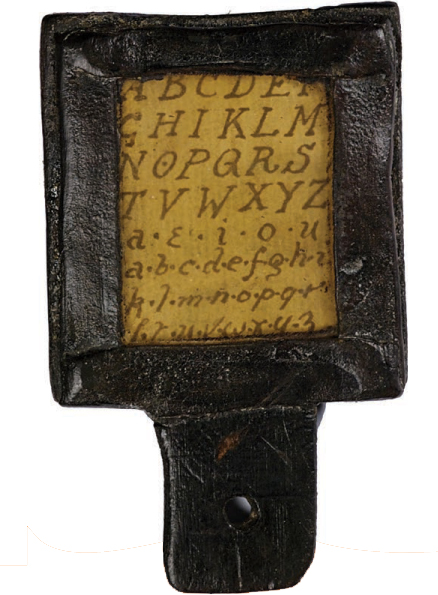
Boys used hornbooks to practice reading and writing.
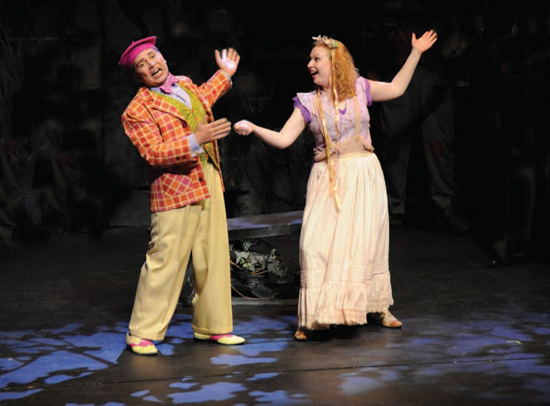
Actors in a scene from an updated modern-dress production of
Next page
